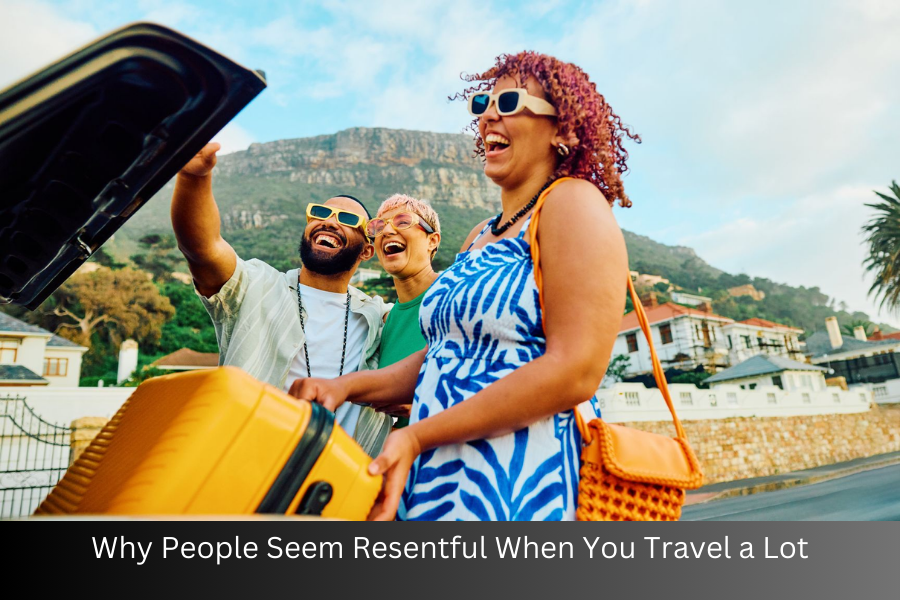Introduction
Traveling can be one of the most fulfilling experiences in life. It opens doors to new cultures, broadens our horizons, and often creates lifelong memories. However, for some people, frequent travelers can evoke feelings of resentment. This phenomenon, although not always discussed openly, is more common than we think. Why People Seem Resentful When You Travel a Lot? Let’s explore some of the underlying reasons that may explain this reaction.
Wiki
| Factor | Description | Impact on Resentment |
| Jealousy | Feelings of envy or longing when others are able to experience things that one cannot. | Triggers negative emotions when someone feels that they are missing out on exciting experiences. |
| Misinterpretation of Privilege | Assumptions that the traveler has wealth, time, or resources that others lack. | Creates frustration when others feel they can’t travel due to financial or situational constraints. |
| Social Media Comparisons | Sharing curated travel photos online can amplify feelings of inadequacy among those who cannot travel as much. | Fosters resentment due to constant comparisons and the portrayal of an idealized life that some may feel disconnected from. |
| FOMO (Fear of Missing Out) | Feelings of exclusion when others are able to travel and experience things while they are not. | Leads to resentment when someone feels left out of social events or experiences because they couldn’t join the traveler. |
| Pressure to Match Expectations | Feeling pressured to travel or keep up with the lifestyle of others who seem to travel frequently. | Creates stress and resentment when individuals feel they need to meet the high expectations of a social group or peer pressure. |
| Financial Assumptions | The belief that frequent travelers are financially privileged, ignoring the reality of budgeting and planning. | Generates frustration when others believe they can’t afford travel but misunderstand the budget-conscious choices made by travelers. |
| Time Constraints | Inability to take time off from work or personal responsibilities to travel. | Leads to resentment when people see others having more freedom to travel while they are constrained by their commitments. |
| Insecurity | Feelings of inadequacy, particularly when a person feels their own life doesn’t measure up to the perceived exciting life of the traveler. | Drives resentment when people compare their lives to others’ adventures, leading to feelings of inferiority or being “left behind.” |
| Burden of Expectations | Social pressure to bring back gifts, share detailed travel experiences, or “change” after traveling. | Causes stress and resentment when travelers feel like their trips come with unrealistic expectations or pressure from others. |
The Role of Jealousy in Resentment
Jealousy is one of the primary emotions that can drive resentment when people see you traveling frequently. While jealousy is often seen as a negative feeling, it’s important to understand that it doesn’t always stem from ill intent. For many, seeing someone else live a life of adventure, exploring faraway places, and seemingly living a carefree existence can highlight their own dissatisfaction with their daily lives.
If someone is stuck in a routine or feels as though they are missing out on life experiences, your travels can serve as a reminder of what they long for but can’t achieve. Jealousy may not necessarily come from a place of bitterness, but rather a longing for a different reality. It’s important to recognize that people often project their own desires or frustrations onto others without even realizing it.
Misinterpretation of Privilege
Another reason why people might seem resentful of your travels is the perception that your ability to travel frequently is a result of privilege. People may assume that you have financial resources, an easier lifestyle, or circumstances that allow you to travel. They might not see the behind-the-scenes hard work and sacrifices that go into making travel possible for you.
This perception of privilege can be amplified if you travel to luxurious or exotic destinations. What some may overlook is that many frequent travelers carefully budget, plan, and make sacrifices in other areas of their lives to afford these trips. When you don’t openly share the planning and budgeting process, others may form assumptions that you have it easy. They may feel frustrated that their own responsibilities, financial constraints, or life situations prevent them from experiencing the same level of freedom.
The Impact of Social Media on Perception
The rise of social media has played a significant role in how travel is perceived by others. Platforms like Instagram, Facebook, and Twitter are filled with curated photos and stories of beautiful places, luxurious experiences, and once-in-a-lifetime adventures. While these images are often shared with the best of intentions, they can contribute to feelings of inadequacy in those who see them.
When you share photos from a beautiful beach or a bustling foreign city, your followers might feel as though they’re being left behind. If they aren’t able to travel as often or are not experiencing the same level of excitement, they may harbor feelings of resentment without even realizing it. This is especially true when social media often only presents the highlights of someone’s life, leaving out the more mundane or challenging aspects.
This kind of online comparison can foster a sense of “missing out” or not living up to certain expectations, which can be frustrating. People might resent the idea that your life seems more exciting or fulfilling than their own, and social media only intensifies this comparison.
FOMO (Fear of Missing Out)
FOMO, or the Fear of Missing Out, is another strong emotion that drives resentment Why People Seem Resentful When You Travel a Lot. If your friends, family, or coworkers are unable to participate in your trips, they may experience feelings of exclusion. This can be particularly difficult if your travels occur during important events or celebrations that they feel left out of.
When people have to see others go on trips without them, the feeling of missing out can be deeply emotional. They might think, “Why didn’t I get an invite?” or “Why can’t I go too?” These feelings can evolve into resentment if they feel like you’re having experiences they can’t access. For some, it’s not just about the trip itself but about feeling disconnected from the person traveling. The sense of distance can feel like a personal loss, especially if the trip takes away time that could have been spent together.
The Pressure to Match Expectations
As more people travel and share their experiences, there can also be a subconscious pressure to match these expectations. Your travels might be part of an ongoing trend of people you know going on vacation or embarking on adventures. While travel is exciting, the pressure to “keep up” with others can cause anxiety and resentment for those who can’t afford to travel as much or are not in a position to do so.
This pressure often manifests as resentment when people feel as though they are expected to keep up with the lives of those who travel regularly. If they see that you are constantly posting about your trips or telling stories about the places you’ve been, they may feel inferior or pressured to be as adventurous or spontaneous as you seem to be.
Financial Assumptions and Resentment
Travel is often expensive, and this fact alone can breed resentment. People might assume that your ability to travel is linked to your wealth or spending habits. If they perceive that you are spending money irresponsibly or have unlimited resources, this can create negative feelings.
What many people may not realize is that frequent travel does not always mean you are rich. In fact, many frequent travelers adopt a minimalist lifestyle or find ways to cut costs in other areas of their lives in order to save for their trips. But this financial strategy may not always be visible to others. Without an understanding of how you prioritize your travel budget, people might jump to conclusions, feeling frustrated that their own financial situation doesn’t allow them the same freedom.
The Burden of Expectations
Frequent travelers may also find themselves the subject of high expectations. If friends and family see that you travel often, they may expect you to bring back unique gifts, souvenirs, or even fascinating stories. This can create pressure, especially if you’re constantly on the go and don’t have the time or resources to meet everyone’s expectations.
Additionally, there may be an assumption that your travels will result in some form of personal transformation that others will want to be a part of. If you come back from a trip with new perspectives or interesting insights, it can be difficult for people who don’t travel as much to relate or feel included. This can result in resentment because they feel like they can’t connect with your experiences.
Time as a Limiting Factor
For many people, time is a significant limitation when it comes to travel. Frequent travelers may be able to take vacations, extended trips, or spontaneous adventures because they have the time to do so, whether it’s due to a flexible job, a break between responsibilities, or the ability to work remotely.
On the other hand, many people are tied to rigid schedules—work, family, and personal obligations often take precedence. When they see someone traveling regularly, it might trigger feelings of resentment because they feel unable to do the same due to their lack of time. The contrast between their life’s demands and your travel opportunities can create frustration and even a sense of injustice.
Insecurity and the Fear of Being Left Behind
Finally, insecurity plays a huge role in why some people might resent you for traveling a lot. If someone is struggling with their own self-image, their sense of success, or their place in the world, seeing others succeed or live out dreams can feel threatening. This insecurity is often internalized, and rather than acknowledging personal feelings of inadequacy, the resentment gets projected onto the traveler.
This insecurity might not always be obvious. People might not directly express that they feel inferior or left behind, but it can affect their perception of your trips. For example, they may feel that you’re leaving them behind in terms of success or happiness.
Handling Resentment with Sensitivity
If you notice that people seem resentful when you travel, it’s important to handle the situation with care and empathy. You can acknowledge their feelings without downplaying your own experiences. This doesn’t mean you should stop sharing your adventures, but rather be mindful of how you communicate them. Showing consideration for those who might feel left out or overlooked can help maintain healthy relationships, even if you’re living a lifestyle they may envy.
At the end of the day, everyone’s journey is different. Travel can be a source of joy, and it’s important to celebrate those moments while also understanding the emotions that might come up for others. By approaching the situation with understanding, you can navigate resentment in a way that strengthens your relationships and keeps you living authentically.
Conclusion
In conclusion, the resentment people feel Why People Seem Resentful When You Travel a Lot is often tied to complex emotions like jealousy, exclusion, and insecurity. While travel is a personal and enriching experience, it can unintentionally highlight what others feel they are missing in their own lives. Whether it’s financial limitations, time constraints, or simply the feeling of being left behind, these factors can breed resentment, even if it’s not openly expressed. Understanding that people’s feelings are often shaped by their own circumstances and desires can help you approach these situations with empathy and awareness.
While your travels bring you joy and personal growth, being mindful of how they might affect those around you can help maintain healthy relationships. There’s no need to stop sharing your experiences, but being considerate about how you do it can make a world of difference in how your travel is perceived. Ultimately, it’s about balance—celebrating your adventures while being understanding of the emotions they may evoke in others.
FAQs
1. Why do people resent you for traveling?
People may resent you for traveling due to feelings of jealousy, exclusion, or a perceived difference in lifestyle. If they can’t afford to travel or have time constraints, they might feel frustrated seeing others have experiences they can’t access. Social comparison and unmet personal desires also play a big role in fueling this resentment.
2. How can I avoid making others feel resentful about my travels?
To avoid resentment, be mindful of how you share your travel experiences. Instead of constantly posting about your trips on social media, try to be sensitive to how others may feel. You can also offer to share your experiences in a way that includes others, like planning a trip together or sharing tips for affordable travel.
3. What is FOMO, and how does it relate to resentment when traveling?
FOMO, or the “Fear of Missing Out,” is when someone feels left out or excluded from experiences that others are having. When you travel frequently, people who can’t join you may feel the pang of FOMO, which can turn into resentment if they perceive you as leading a more exciting or fulfilling life.
4. Is it bad to talk about my travels if people seem resentful?
It’s not inherently bad to talk about your travels, but being aware of the context and your audience is important. If someone seems resentful, it may be worth gauging their emotional state before sharing stories or posting pictures. Showing empathy and understanding can help ease negative feelings.
5. How can I deal with friends or family who seem resentful of my travels?
When dealing with resentful friends or family, it’s crucial to communicate openly and empathetically. Acknowledge their feelings and let them know that you understand their situation. You can also offer to share travel experiences in a way that makes them feel included, whether through souvenirs, stories, or future travel plans together.
Explore the latest news and updates on Play Hop




